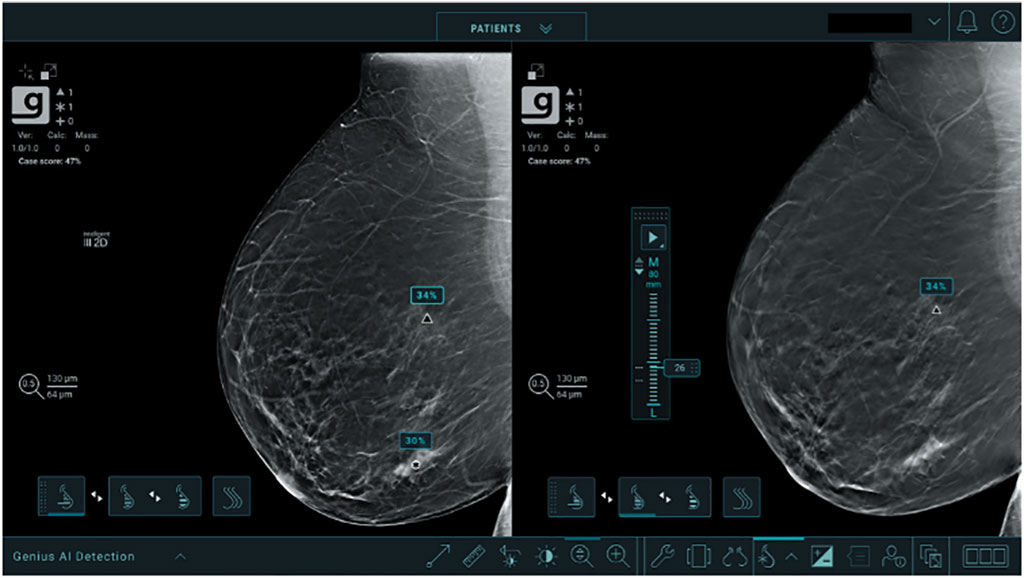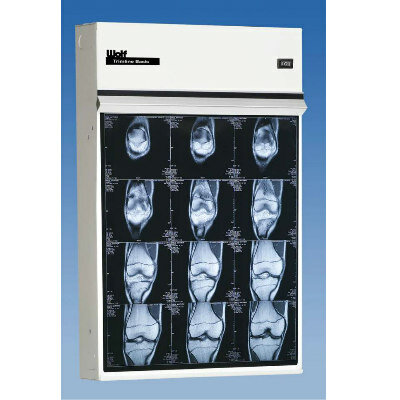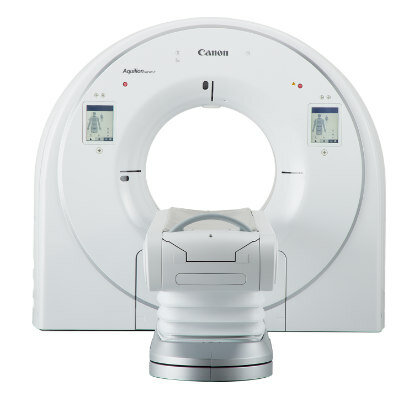Hologic Receives FDA Clearance for Genius AI Detection Technology for Early Breast Cancer Detection
|
By MedImaging International staff writers Posted on 02 Dec 2020 |

Image: The Genius AI Detection software (Photo courtesy of Hologic, Inc.)
Hologic, Inc. (Marlborough, MA, USA) has received US Food and Drug Administration (FDA) clearance for its Genius AI Detection technology, a new deep learning-based software designed to help radiologists detect subtle potential cancers in breast tomosynthesis images.
The new technology which Hologic has now made commercially available represents a pivotal milestone in the early detection of breast cancer, as studies showed Genius AI Detection software aids in the identification and early detection of breast cancer when used with the Genius 3D Mammography exam. The new technology highlights areas with subtle potential cancers that can be difficult to detect for further examination by the radiologist, and is designed to provide higher sensitivity and a false-positive rate much lower than Hologic’s previous generation CAD products.
The new software delivers key metrics at the time of image acquisition to help radiologists categorize and prioritize cases by complexity and expected read time in order to optimize workflow and expedite patient care. It is the only deep learning product on the market that runs on the acquisition workstation of the mammography system without the need for a separate server, providing a simple, convenient and secure environment. The Genius AI Detection software is the only 3D CAD solution that supports Hologic’s latest innovations in tomosynthesis imaging, Clarity HD and 3DQuorum imaging technology, in addition to standard-resolution tomosynthesis.
“As the latest breakthrough in breast cancer screening, Genius AI Detection reinforces Hologic’s commitment to improving cancer detection, optimizing workflow and enhancing the patient experience across every step of the breast health care continuum,” said Jennifer Meade, Hologic’s Division President, Breast and Skeletal Health Solutions. “Not only did studies show that Genius AI Detection aids in image interpretation by highlighting suspicious, and often subtle, areas of interest, it also provides the radiologist the opportunity to prioritize the most concerning patient cases. This is a real game changer as it has the potential to shorten the cycle between screening and diagnostic follow-up, and ultimately improve patient outcomes.”
The new technology which Hologic has now made commercially available represents a pivotal milestone in the early detection of breast cancer, as studies showed Genius AI Detection software aids in the identification and early detection of breast cancer when used with the Genius 3D Mammography exam. The new technology highlights areas with subtle potential cancers that can be difficult to detect for further examination by the radiologist, and is designed to provide higher sensitivity and a false-positive rate much lower than Hologic’s previous generation CAD products.
The new software delivers key metrics at the time of image acquisition to help radiologists categorize and prioritize cases by complexity and expected read time in order to optimize workflow and expedite patient care. It is the only deep learning product on the market that runs on the acquisition workstation of the mammography system without the need for a separate server, providing a simple, convenient and secure environment. The Genius AI Detection software is the only 3D CAD solution that supports Hologic’s latest innovations in tomosynthesis imaging, Clarity HD and 3DQuorum imaging technology, in addition to standard-resolution tomosynthesis.
“As the latest breakthrough in breast cancer screening, Genius AI Detection reinforces Hologic’s commitment to improving cancer detection, optimizing workflow and enhancing the patient experience across every step of the breast health care continuum,” said Jennifer Meade, Hologic’s Division President, Breast and Skeletal Health Solutions. “Not only did studies show that Genius AI Detection aids in image interpretation by highlighting suspicious, and often subtle, areas of interest, it also provides the radiologist the opportunity to prioritize the most concerning patient cases. This is a real game changer as it has the potential to shorten the cycle between screening and diagnostic follow-up, and ultimately improve patient outcomes.”
Latest Industry News News
- Hologic Acquires UK-Based Breast Surgical Guidance Company Endomagnetics Ltd.
- Bayer and Google Partner on New AI Product for Radiologists
- Samsung and Bracco Enter Into New Diagnostic Ultrasound Technology Agreement
- IBA Acquires Radcal to Expand Medical Imaging Quality Assurance Offering
- International Societies Suggest Key Considerations for AI Radiology Tools
- Samsung's X-Ray Devices to Be Powered by Lunit AI Solutions for Advanced Chest Screening
- Canon Medical and Olympus Collaborate on Endoscopic Ultrasound Systems
- GE HealthCare Acquires AI Imaging Analysis Company MIM Software
- First Ever International Criteria Lays Foundation for Improved Diagnostic Imaging of Brain Tumors
- RSNA Unveils 10 Most Cited Radiology Studies of 2023
- RSNA 2023 Technical Exhibits to Offer Innovations in AI, 3D Printing and More
- AI Medical Imaging Products to Increase Five-Fold by 2035, Finds Study
- RSNA 2023 Technical Exhibits to Highlight Latest Medical Imaging Innovations
- AI-Powered Technologies to Aid Interpretation of X-Ray and MRI Images for Improved Disease Diagnosis
- Hologic and Bayer Partner to Improve Mammography Imaging
- Global Fixed and Mobile C-Arms Market Driven by Increasing Surgical Procedures
Channels
Radiography
view channel
Novel Breast Imaging System Proves As Effective As Mammography
Breast cancer remains the most frequently diagnosed cancer among women. It is projected that one in eight women will be diagnosed with breast cancer during her lifetime, and one in 42 women who turn 50... Read more
AI Assistance Improves Breast-Cancer Screening by Reducing False Positives
Radiologists typically detect one case of cancer for every 200 mammograms reviewed. However, these evaluations often result in false positives, leading to unnecessary patient recalls for additional testing,... Read moreMRI
view channel
Low-Cost Whole-Body MRI Device Combined with AI Generates High-Quality Results
Magnetic Resonance Imaging (MRI) has significantly transformed healthcare, providing a noninvasive, radiation-free method for detailed imaging. It is especially promising for the future of medical diagnosis... Read more
World's First Whole-Body Ultra-High Field MRI Officially Comes To Market
The world's first whole-body ultra-high field (UHF) MRI has officially come to market, marking a remarkable advancement in diagnostic radiology. United Imaging (Shanghai, China) has secured clearance from the U.... Read moreUltrasound
view channel.jpg)
Diagnostic System Automatically Analyzes TTE Images to Identify Congenital Heart Disease
Congenital heart disease (CHD) is one of the most prevalent congenital anomalies worldwide, presenting substantial health and financial challenges for affected patients. Early detection and treatment of... Read more
Super-Resolution Imaging Technique Could Improve Evaluation of Cardiac Conditions
The heart depends on efficient blood circulation to pump blood throughout the body, delivering oxygen to tissues and removing carbon dioxide and waste. Yet, when heart vessels are damaged, it can disrupt... Read more
First AI-Powered POC Ultrasound Diagnostic Solution Helps Prioritize Cases Based On Severity
Ultrasound scans are essential for identifying and diagnosing various medical conditions, but often, patients must wait weeks or months for results due to a shortage of qualified medical professionals... Read moreNuclear Medicine
view channelNew PET Agent Rapidly and Accurately Visualizes Lesions in Clear Cell Renal Cell Carcinoma Patients
Clear cell renal cell cancer (ccRCC) represents 70-80% of renal cell carcinoma cases. While localized disease can be effectively treated with surgery and ablative therapies, one-third of patients either... Read more
New Imaging Technique Monitors Inflammation Disorders without Radiation Exposure
Imaging inflammation using traditional radiological techniques presents significant challenges, including radiation exposure, poor image quality, high costs, and invasive procedures. Now, new contrast... Read more
New SPECT/CT Technique Could Change Imaging Practices and Increase Patient Access
The development of lead-212 (212Pb)-PSMA–based targeted alpha therapy (TAT) is garnering significant interest in treating patients with metastatic castration-resistant prostate cancer. The imaging of 212Pb,... Read moreGeneral/Advanced Imaging
view channelBone Density Test Uses Existing CT Images to Predict Fractures
Osteoporotic fractures are not only devastating and deadly, especially hip fractures, but also impose significant costs. They rank among the top chronic diseases in terms of disability-adjusted life years... Read more
AI Predicts Cardiac Risk and Mortality from Routine Chest CT Scans
Heart disease remains the leading cause of death and is largely preventable, yet many individuals are unaware of their risk until it becomes severe. Early detection through screening can reveal heart issues,... Read moreImaging IT
view channel
New Google Cloud Medical Imaging Suite Makes Imaging Healthcare Data More Accessible
Medical imaging is a critical tool used to diagnose patients, and there are billions of medical images scanned globally each year. Imaging data accounts for about 90% of all healthcare data1 and, until... Read more
Global AI in Medical Diagnostics Market to Be Driven by Demand for Image Recognition in Radiology
The global artificial intelligence (AI) in medical diagnostics market is expanding with early disease detection being one of its key applications and image recognition becoming a compelling consumer proposition... Read moreIndustry News
view channel
Hologic Acquires UK-Based Breast Surgical Guidance Company Endomagnetics Ltd.
Hologic, Inc. (Marlborough, MA, USA) has entered into a definitive agreement to acquire Endomagnetics Ltd. (Cambridge, UK), a privately held developer of breast cancer surgery technologies, for approximately... Read more
Bayer and Google Partner on New AI Product for Radiologists
Medical imaging data comprises around 90% of all healthcare data, and it is a highly complex and rich clinical data modality and serves as a vital tool for diagnosing patients. Each year, billions of medical... Read more





















